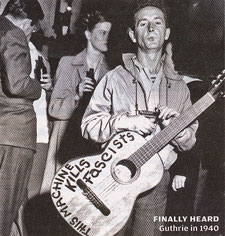[ Previous
| Table of Contents | Next
]
Foundations of 60s Folk Rock
c. 1900: protest music at the turn of the century inspired by ...
IWW - International Workers of the World (a.k.a. "Wobblies")
- unionists who penned songs as part of a drive to achieve equality for American
workers
- their anthem was "Solidarity Forever" (sung to the tune of "Battle
Hymn of the Republic")
They have taken untold millions that they never toiled to earn
We can break their haughty power, gain our freedom when we learn
Solidarity forever ...
Woody Guthrie
Woody Guthrie continued the legacy of the protest
song after federal & state authorities raided & closed IWW offices during
the "Red Scare" following WWI 
- hosted a local radio show in Los Angeles where he read radical newspapers
over the air
- moved to NYC where he began writing a daily column for the Communist People's
Daily World and the Daily Worker
- penned "This Land is Your Land," "Billy the Kid," stating
...
- "I don't sing any songs about the nine divorces of some millionaire
play gal or the ten wives of some screwball. I've just not got the time
to sing those kinds of songs and I wouldn't sing them if they paid me
$10,000 a week. I sing the songs of the people that do all of the little
jobs and the mean and dirty hard work in the world and of their wants
and their hopes and thir plans for a decent life."
- motto emblazened on guitar: "This Machine Kills Fascists" (see photo)
- 1952 - diagnosed as an alcoholic and confined to a mental institutions until the diagnosis was later changed correctly to Huntington's chorea, a genetically transmitted degenerative disorder of the nervous system from which his mother had died
- he died in October of 1967, leaving behind a singer-songwriter son, Arlo Guthrie (who performed at Woodstock in 1969)

Pete Seeger
Pete Seeger joined Woody, roaming the countryside
to sing songs to the American worker
- 1940--founded the Almanac Singers (Seeger,
Guthrie, Lee Hayes, & Millard Lampell) ... criss-crossed the nation touring
for 2 yrs
- 1949--the Weavers (without Guthrie) debut at
the Village Vanguard, singing "On Top of Old Smoky," "Goodnight
Irene," and other folk songs
- Seeger was an important songwriter during the folk-music movement, composing
"If I Had a Hammer," "Where Have All the Flowers Gone,"
"Turn, Turn, Turn" and many other well-known songs
protest singers (like Seeger & Guthrie) fell into disrepute during the
McCarthyite witch hunts
- doggedly pursuing Communist sympathizers
- many folk music performers were black-balled by the networks and recording
studios.
[ Previous
| Table of Contents | Next
]

